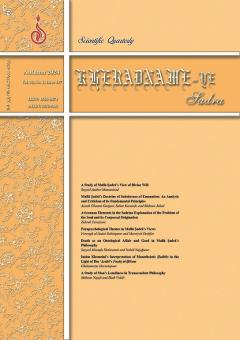Avicennan Elements in the Sadrian Explanation of the Problem of the Soul and its Corporeal Origination
Subject Areas : ملاصدراپژوهی و اندیشۀ حکمت متعالیه
1 - Professor at the Department of Islamic Philosophy and Wisdom, Faculty of Theology and Islamic Teachings, AlZahra University, Tehran, Iran
Keywords: creation of the human soul and its faculties, corporeal origination of the soul, Ibn Sīnā, Mullā Ṣadrā,
Abstract :
Undoubtedly, one of the most important philosophical discussions among the majority of philosophers is the problem of the existence of the soul, its essence, the quality of its appearance, its immateriality, and its subsistence. This problem is also one of the most fundamental and crucial issues for Muslim philosophers, and its kālāmī and philosophical outcomes cannot be ignored. This is because several religious beliefs can be explained depending on accepting this main element in Man’s existence. Without the soul, Man is not responsible for any obligation issued on the part of the holy legislator and, naturally, resurrection and the related problems become pointless. The importance of the soul for philosophers who are not committed to kālāmī and religious views indicates that this problem, irrespective of its religious nature, holds an important place in philosophy. Ibn Sīnā and Mullā Ṣadrā, as two philosophers who are also concerned about religious beliefs, have paid particular attention to the problem of the soul. Mullā Ṣadrā has discussed the existence of the soul, demonstrated its essential nature and subsistence, and explained the quality of its appearance in the form of corporeal origination, in fact, his new views in this regard are quite famous. However, this paper is intended to reveal that many of his discussions regarding the problem of the soul have been exactly borrowed from Ibn Sīnā. Referring to Avicennan views in Mullā Ṣadrā’s philosophy can greatly contribute to a correct understanding and justifiable interpretation of Mullā Ṣadrā’s ideas, particularly concerning the perception of the concept of the corporeality of the soul, which some wrongly equate with the corporeality of the soul at the beginning of its creation. Here, the author demonstrates that neither is this interpretation of Mullā Ṣadrā’s words correct, nor is this principle solely attributed to him. Rather, he has borrowed Ibn Sīnā’s philosophical views in this regard, as is the case in his other discussions in relation to the soul.
ابنسینا، بوعلی (1363الف) اشارات و تنبیهات، ترجمه و شرح حسن ملکشاهی، تهران: سروش.
ابنسینا، بوعلی (1363ب) روانشناسی شفا، ترجمۀ اکبر داناسرشت، تهران: امیرکبیر.
ابنسینا، بوعلی (1363ج) المبدأ و المعاد، بهاهتمام عبدالله نورانی، تهران: انجم آثار و مفاخر فرهنگی.
ابنسینا، بوعلی (1375الف) النفس من کتاب الشفاء، تحقیق حسن حسنزاده آملی، قم: مرکز نشر اسلامی.
ابنسینا، بوعلی (1375ب) الاشارات و التنبیهات، بهمراه شرح نصیرالدین طوسی و قطبالدین رازی، قم: نشر البلاغه.
ابنسینا، بوعلی (1383) رساله نفس، تحقیق و تصحیح موسی عمید، همدان: دانشگاه بوعلی سینا.
ارسطو (1389) درباره نفس، ترجمه و تحشیه علیمراد داودی، تهران: حکمت.
برن، ژان (1373) ارسطو و حکمت مشاء، ترجمۀ ابوالقاسم پورحسینی، تهران: امیرکبیر.
فارابی، ابونصر (1366) السیاسة المدنیة، تحقیق و تعلیق فوزی نجّار، تهران: الزهرا.
فارابی، ابونصر (1405ق.الف) الجمع بین رائی الحکیمین، تحقیق و تعلیق البیر نصری نادر، تهران: الزهرا.
فارابی، ابونصر (1405ق.ب) فصول منتزعه، تحقیق و تعلیق فوزی نجّار، تهران: الزهرا.
کاپلستون، فردریک (1362) تاریخ فلسفه، ج1، قسمت اول و دوم، ترجمۀ سیدجلالالدین مجتبوی، تهران: علمی فرهنگی.
مصباح یزدی، محمدتقی (1375) شرح اسفار؛ کتاب نفس، جزء اول، تحقیق و نگارش محمد سعیدیمهر، قم: موسسه امام خمینی(ره).
مصلح، جواد (1352) علم النفس یا روانشناسی صدرالمتألهین، ترجمه و تفسیر سفر نفس کتاب اسفار، تهران: دانشگاه تهران.
ملاصدرا (1381) المبدأ و المعاد، تصحیح و تحقیق محمد ذبیحی و جعفر شاهنظری، تهران: بنیاد حکمت اسلامی صدرا.
ملاصدرا (1360) الشواهد الربوبیة فی المناهج السلوکیة، تحقیق و تصحیح سیدجلالالدین آشتیانی، مشهد: مرکز نشر دانشگاهی.
ملاصدرا (1981) الحکمة المتعالیة فی الأسفار العقلیة الأربعة، ج 8، بیروت: دار احیاء التراث العربی.
ملکشاهی، حسن (1363) حرکت و استیفای اقسام آن، تهران: سروش.

